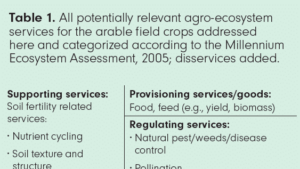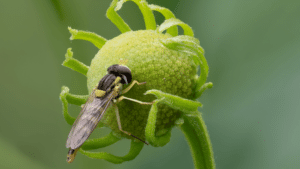
An innovative program from Syngenta Canada uses wildflowers to promote bee populations and bee health while enhancing the view on golf courses.
Taking in the view. If you’re a golfer, it’s probably a big part of what draws you to the sport. And thanks to a plan to enhance bee populations through the infusion of wildflowers, the view at your favourite golf course could get even better.
Syngenta Canada is piloting a program called Operation Pollinator, which is designed to increase the number of pollinating insects on and near golf courses by transforming out-of-play areas into improved habitats for bees and other important pollinators.
To-date, Operation Pollinator has been launched at two courses in southern Ontario — the Brantford Golf and Country Club and Cutten Fields in downtown Guelph. Throughout 2014-2015, the program will be expanded beyond the initial pilot phase to add additional golf courses. This means more Canadian courses could soon be sporting a lot more wildflowers.
“We gave a presentation at the Canadian International Turfgrass Conference in Vancouver [in February] to talk about this program, and the amount of interest from golf courses was remarkable,” says Paul Hoekstra, stewardship manager with Syngenta Canada.
The Brantford and Guelph courses join hundreds of others in the United States and Europe benefitting from the program. According to the company, the launch of Operation Pollinator in Ontario last year was, in part, based on recognition of the success of similar Syngenta initiatives in other parts of the world during the past decade.
Originally launched in the United Kingdom, the program includes both on-farm and off-farm components and operates in more than 13 countries. “In the broadest sense, it is about restoring natural habitats and food sources to improve the fortunes of native pollinators, such as bumblebees, butterflies and other insects that thrive when diverse sources of food are available,” Hoekstra says.
In the next few years, golfers will start to see an uptick in wildflowers and pollinator-friendly habitats on courses throughout Canada.
Through Operation Pollinator, Syngenta provides participating golf courses with a custom-blended seed mix that includes native wildflowers. The golf course then uses this seed and other management practices to create pollen- and nectar-rich habitats in out-of-play areas.
According to Hoekstra, Operation Pollinator not only promotes bee health, but also helps build the environmental profile of golf courses.
“It allows us to work with golf courses or other stakeholders to develop seed mixes that are unique to our climate, that are unique to our growing conditions, and that have also been scientifically validated,” he says.
According to Paul Evenden, course superintendent at the Brantford Golf and Country Club, golf courses provide great potential to create essential habitat and food sources for a range of native bees and pollinating insects. “Experiences in other jurisdictions have demonstrated that the creation of even small areas of dedicated habitat can significantly increase the number of pollinators,” he says.
Aesthetic Benefits
David Kuypers, course superintendent at Cutten Fields, says an added benefit of the program is that it provides new visual features for golfers to enjoy. “Operation Pollinator provides an excellent opportunity for golf courses to diversify their fields of play,” he says, adding that those parts of Cutten Fields that aren’t directly in play actually make up most of the course.
“It certainly provides an aesthetic benefit compared to what was there, which would have been woody weeds or aggressive grasses,” Kuypers explains.
Because this is the first year of Operation Pollinator seeding at the course, it will be two or three years before people see the full effect of the program — a bank of wildflowers of different varieties that will be in bloom virtually for all of the growing season. “The bees will have a forage source throughout the season,” says Kuypers, adding that golfers will benefit from a changing landscape that reflects different
wildflower blooms.
Kuypers says the leadership of Cutten Fields had no reservations about pitching in to promote bee health. “Golf courses unlike agriculture, don’t have a direct benefit from pollinators, but bee health is important to everybody in the country,” he says. “We’re a privately managed green space right in the middle of an urban community, so if we can use part of our green space and provide a benefit to the community through something like this, we’re certainly willing to.”
Bee populations and bee health are top-of-mind issues these days, with some areas of the world dealing with significant bee health issues and population declines. “There is general scientific consensus that bee health is affected by a variety of interdependent factors including things like parasitic mites, disease, poor nutrition, habitat, inadequate food supplies and management practices, including pesticides, which must be used properly to minimize their impact on bee populations,” Hoekstra says.
However, he adds that the number of bee colonies in Canada has actually been increasing in recent decades, referring to Statistics Canada data showing a 40 per cent jump in bee colony numbers since the 1950s. “It goes without saying that pollinators are important to us all,” Hoekstra says. “We want to build on what we have through initiatives such as Operation Pollinator for the benefit of both managed and native pollinators.”
Syngenta, he says, has a vested interest in protecting pollinators because “the products we sell and the growers we’re working with are dependent on bees to make their livelihood. We require healthy bees, not just for our business, but also for the health of the business of our customers. So for us, it’s about making sure we can work holistically with various tools to promote bee health, whether it’s through biodiversity or the stewardship of our products.”
Mark Halsall














